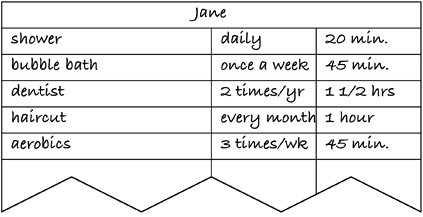Caring for the People in Your Family
When we work on putting together a family schedule, we
completely forget about the essentials needed to take care of the people
in our family. As we mentioned before, we get so caught up in the
extra, special activities that we overlook the basics that are crucial
to health and happiness. We'll get to the extras later, but for now
let's make sure we cover the basics.
Every person needs time in his schedule for the following:
Now is a good time to take
out your spiral notebook and start making some lists. Each family
member should have a personalized list of needs because needs vary based
on age, gender, personal preference, and personal circumstance. For
example, someone who plays soccer as an enrichment activity
will need to schedule less exercise time than someone who chooses chess
club for enrichment. For each list, you should also indicate how much
time each item will take and how often each item needs to be done. Figure 1 shows an example of the beginning of a personal needs list.

Just as when you have a
paid job you must block out from your schedule the chunk of time you
must be at work, you also must block out a huge chunk of your time for
sleep. Individual sleep needs vary, but Table 2 will give you an idea of how much time to allow each person in your family for sleep.
Table 2. Average Sleep Needs Per Day by Age
| Age | Hours |
|---|
| Newborns | 10–19 |
| 2–12 months | 14–15 |
| 12–18 months | 13–15 |
| 18 months–3 years | 12–14 |
| 3–5 years | 11–13 |
| 5–12 years | 9–11 |
| 12–20 years | 8–10 |
| Adults | 7–9 |
|
Many people shave more
and more time off their sleep block because they think this is the only
part of their schedule in which they can get time to do the things they
don't get around to doing otherwise. But by depriving yourself of sleep,
you actually reduce the amount of productive time you have while you're
awake because insufficient sleep
note
It doesn't take much sleep to make a huge impact.
Consider these facts:
Sleeping one hour longer at night generally boosts your alertness by 25%.
One night's sleep debt reduces the time to reach total exhaustion by 11%.
In
the four days after we lose an hour to switch to daylight savings time,
there is a 7% increase in accidental deaths compared to the one-week
periods before and after that time!
Diminishes your energy and performance during the day
Reduces your ability to concentrate
Impairs your memory
Depletes your immune system
Reduces your motivation
Makes you indecisive
Causes you to lose your sense of humor
caution
Don't wake up early to work out. The stress from the sleep loss cancels the benefits of the exercise!
In other words, what you lose in time by getting the sleep you need, you make up in increased productivity when you're awake.
|

Most people
are familiar with the notion that while they sleep their bodies repair
themselves, and most people would not be surprised to learn that during
sleep the brain stockpiles neurotransmitters—norepinephrine and
serotonin—that it will need for attention and learning when they're
awake. |
Most
people also think that while they sleep their brains rest. Not so. Your
brain is often more active when you're asleep than when you're awake.
It's busy making sure it stays organized:
It grows neural connections to hold memories, analogous to your going out and buying a file cabinet and other filing supplies. It
goes through its long-term memory storage and decides to forget some
things, the same way you'd go through a filing cabinet and throw out old
papers that were once important but that you no longer need to keep. It frees up capacity for new long-term memories, just as cleaning out your file cabinets gives you room to file newer papers. While
it's going through your long-term memory, your brain is also
strengthening your memory of important stored events, just as running
across old papers may remind you that you have them. Your
brain discards some short-term memories instead of moving them to
long-term memory, similar to your throwing out junk mail after a quick
review. Your
brain takes the new memories it's going to keep and which it stored
temporarily in its hippocampal zone and moves them systematically into
the brain's neocortal zone, similar to your sorting through piles of
paper and filing documents where they belong.
In
other words, getting enough sleep is directly related to your brain's
ability to manage information. If you don't get enough sleep, your brain
will become frantic, looking around for misplaced information the same
way you become frantic looking around for misplaced papers if you don't
take enough time to put them in their proper place. |